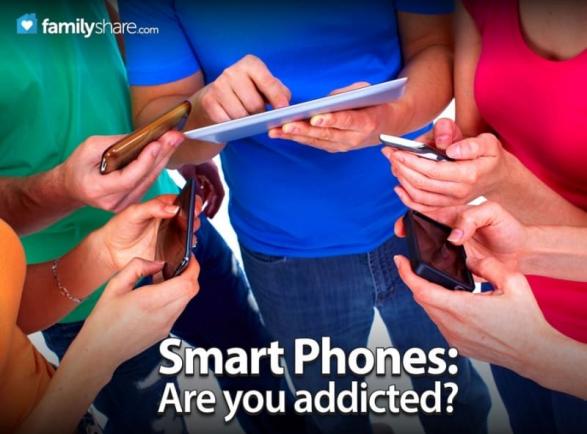
Think of all the things you do on your smartphone in one day: talking, emailing, texting, reading the news, watching shows, Tweeting, checking Facebook, Pinterest, the latest sports scores, and on and on. Most individuals spend a minimum of five hours per day on their handheld device. Excessive smartphone use, more than eight hours per day, is often justified with the excuse of staying connected and on top of things. But if you say "Hold on a sec, I've got to check this" (or something like it) repeatedly during one conversation you may be a smartphone addict.
Are you noticing the following in yourself or a loved one?
Increased amounts of time spent on computer and Internet activities
Failed attempts to control behavior
Heightened sense of euphoria while involved in computer and Internet activities
Craving more time on the computer and Internet
Neglecting friends and family
Feeling restless when not engaged in online activity
Being dishonest with others
Computer use interfering with job or school performance
Feeling guilty, ashamed, anxious or depressed as a result of online behavior
Changes in sleep patterns
Physical changes such as weight gain or loss, backaches, headaches or carpal tunnel syndrome
Withdrawal from other pleasurable activities
If yes was answered to three or more of these questions, smartphone usage habits could be deemed abuse. Answering yes to five or more questions suggests addiction.
Addiction is the state of being enslaved to a habit or practice that is psychologically or physically habit-forming and can be recognized when the behavior begins to cause impairment to everyday life. Addicts often feel they can and ought to be able to just stop, but addictions reside in the brain. Check out Addiction and the Brain to learn how addictions work.
Tyler Smith, Executive Director of Liberty Springs, a residential addiction recovery program specializing in online addictions in teenagers, says a smartphone addict will often organize their life around the behavior. This is done by pre-planning activities to allow time for smartphone use or by continuing typical daily activities but at a much lower level.
You cannot determine if a person has an addiction just by talking to him or her. Recognizing an addiction is an admission that one is not in control but is being controlled and people struggle with that kind of acknowledgment. Addicts may feel threatened (resulting in denial), resentment and mistrust. Smith recommends talking with teenagers in the spirit of love. Engaging a third-party such as a therapist can also be helpful as it creates a neutral and safe environment where the family can discuss freely.
Because smartphone over-usage is so common, by the time an addiction is recognized, it may be too late for effective outpatient treatment. However, a proper assessment will help determine whether outpatient treatment might be a viable option. reSTART Internet Addiction Recovery Program is a pioneer in residential online addiction treatment for adults. Many other wilderness programs and residential treatment facilities are adding online addiction to their services because of the growing demand. Smith states that the end goal of any treatment program is to overcome the addiction, encourage healthy and productive use of technology as a tool, reset the brain, rebuild damaged family relationships and rekindle an excitement for real life.
"When you can stop, you don't want to, and when you want to stop, you can't..."� (Luke Davies, "Candy").

